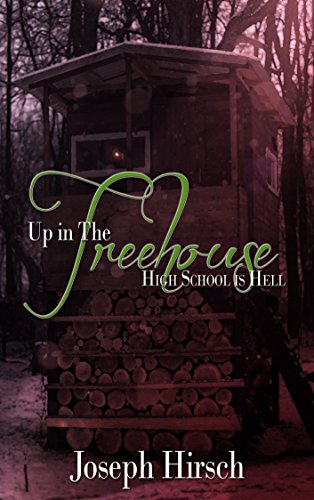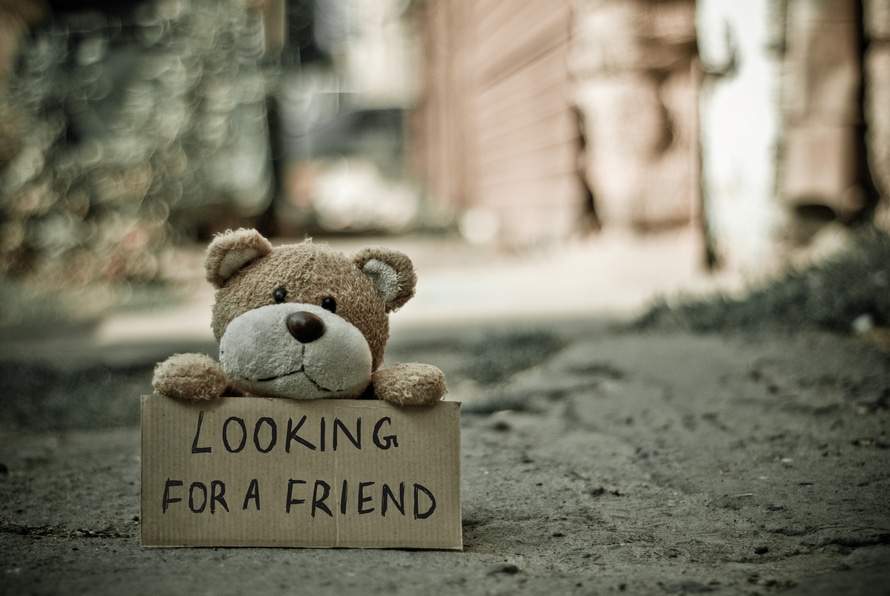
I SELDOM COMMENT on why a novel impacts me. My reviews are objective, and I keep the personal side to myself. I’m making an exception with Joseph Hirsch’s contemporary literature novel, Up in the Treehouse (September 2016).
I grew up as a military brat until I was on my own at seventeen. When I was fourteen, we moved across the country from a large military base in a small town to a small base in a large city. For junior high, the kids attended a city school. I was naïve enough to view this as a wonderful adventure.
On my first day of grade nine, my mother drove me to school, which spared me the indignity of arriving in the khaki green military bus with Canadian Armed Forces emblazoned across the side. Unaware of what waited me inside that sprawling brick building of torture, I wore a brown tweed skirt, a blouse with a horse on it, and a pair of striped knee socks… they had toe-separators—I know, what was I thinking? With my buckteeth encased in shiny railway braces and coke-bottle glasses magnifying my eyes, I entered a schoolyard where the acceptable dress code was torn jeans, black leather jackets, and switchblades. Many of the boys had a chain attached to their wallets, I suppose as homage to the Hells Angels. It took a hot minute for me to realize I was in trouble.
I hid in the shadows of a doorway and watched a gang of scary adolescents. More sauntered over to the waiting pack, and the excited newcomers punched their buddies’ shoulders and sneered with little ratty teeth on display. Within minutes, it became clear what they were waiting for: the base bus. As the unsuspecting military brats stepped off the bus, the gang moved in and picked its target. Some of the kids had attended the school the previous year. They understood the ritual and weren’t about to become the hapless victim of a gang of animals. They wore the right clothes, showed-off their knives, and glared in a menacing way at the hoodlums lying in wait. New kids make easy targets.
 Watching the girls exit, I realized that none was a bully magnet. They wore makeup and looked years older than their age. These giggling, pretty girls were immediately identified as part of the popular crowd. They belonged to the herd, and the bullies parted to allow them safe passage. I may have had a stay of execution by not riding the bus on the first day, but I was the perfect female victim. Flying under the radar wasn’t going to be possible. In addition to suffering a homely stage, I had a loud voice, was socially awkward, and had never had a lot of friends. That left the question of the male victim.
Watching the girls exit, I realized that none was a bully magnet. They wore makeup and looked years older than their age. These giggling, pretty girls were immediately identified as part of the popular crowd. They belonged to the herd, and the bullies parted to allow them safe passage. I may have had a stay of execution by not riding the bus on the first day, but I was the perfect female victim. Flying under the radar wasn’t going to be possible. In addition to suffering a homely stage, I had a loud voice, was socially awkward, and had never had a lot of friends. That left the question of the male victim.
Peter was the son of an officer who had moved onto the base the same time we did. They lived a few houses down from mine. He was small for fourteen and was fond of inventing things and conducting bizarre scientific experiments. He had longish blond hair, huge blue eyes, and feminine features.

The only way he would have stood out more in that schoolyard of degenerates would be if he had worn an archery target strapped across his back. The second he tugged his book bag free from the closing bus doors, I knew Peter and I would suffer unspeakable horrors.
On the second day of school, I trudged to the parking lot to wait for the hideous khaki bus that would identify me as one of the loathed military brats. I was stupid enough to believe that our outcast status at the junior high bound us together. The military bullies quickly relieved me of that sentiment and confirmed my suspicion that I was a perfect target. After all, I was a bespectacled freak with bucky-beaver teeth and a weird Maritime accent. They teased me and called me names, but they didn’t hit me. My exclusion from a physical beating may have been because I was tiny and a girl, but it was probably because they were too busy molesting Peter.

Three boys forced Peter to the ground, tore open his button-down shirt, and threw lit matches on his chest. Inflicting pain was insufficient. While the herd chortled at Peter’s tears, the bullies pulled down his pants and verbally eviscerated him. Not every boy waiting on that tarmac hollered encouragement to the monsters terrorizing Peter, but no one stopped it.
After studying psychology, I understand why. Underneath the astonishing physical and mental cruelty of those adolescents was hard-boiled fear. Herd mentality equates to self-preservation. Isolating the weak and passively allowing or actively participating in their torture shields you from attack.

When the khaki bus pulled up at the school, the civilian gang was waiting for Peter and me. Four times a day—very morning and afternoon on the schoolyard and again on the base—we suffered demoralizing humiliation and physical abuse at the hands of our peers.
I didn’t fare as badly as Peter, but my scars run deep. At the age of fourteen, my life became survival. I stopped riding that bus, even though it took nearly an hour to walk to school. I learned where the best hiding spots were and how to elude the most savage kids.
I was the new kid at three different high schools, each one a worse nightmare than the one before. But by then the braces were gone, contacts were in place, and I’d blossomed well enough that beating me up wasn’t the first thought that entered the minds of the young men whose paths crossed mine. That opened a portal into a different ring of hell. Fearing that their boyfriends would stray, girls would accost me outside the school while their boyfriends cheered them on. Eventually, fear morphed into rage. But fighting back doesn’t deter a pack of bullies. They add reinforcements. I had to learn to be smarter, faster, and more deadly than the bullies were. The happiest day of my young life was a nasty rumour that a mean-spirited girl spread. I was nuts—I can’t recall what crazy thing I allegedly did to earn this label. Her rumour had the opposite effect than what she’d planned, because people fear the unpredictability of insanity. By grade twelve, the bullies were giving the crazy girl a wide berth. I’d given up on the youthful, idealistic concept of “friends” so expulsion from the herd suited me fine. Compared to the ruthless savagery teenagers perpetrate on their victims, loneliness is a cake-walk.

I survived the horrific experience of school, but it changed the way I view the world. You’ve read my books, right? Bet you aren’t wondering where I get the ideas for my psychological thrillers any longer.
When I was fourteen, I believed in the goodness of people. By seventeen, I understood evil. As an adult, I grasp the cognitive neuroscience of personality dynamics. Knowledge is healing. But there are times when I still wake up in a cold sweat, panicked that I have to go to school.
For you, maybe school was a wonderful time and you made lifelong friends. If so, I envy you and hope you appreciate how blessed you are. Maybe you were a bully, in which case I hope you grew up at some point and didn’t end up a megalomaniac in a career where you hold a position of authority over others.
Up in the Treehouse is a brilliantly written piece of literature that depicts the reality of a school hierarchy and the psychological ramifications on the miserable kids on the bottom echelon. The descriptive narrative is some of the best writing I’ve read. Hirsh doesn’t turn the bullies into caricatures or candy-coat the cause and effect. There’s no didactic lesson or implausible happenstance where everyone gets his comeuppance or reward. Inequity is a fact of life in every high school.
Hirsch tells a poignant coming-of-age story, which engages the reader by showing the heart-wrenching reality of bullying. I highly recommend this book.
You can read my editorial review here.






